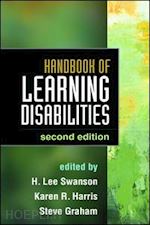I. Foundations and Current Perspectives1. Overview of Foundations, Causes, Instruction, and Methodology in the Field of Learning Disabilities, H. Lee Swanson, Karen R. Harris, & Steve Graham2. A Brief History of the Field of Learning Disabilities, Daniel P. Hallahan, Paige C. Pullen, & Devery Ward3. Classification and Definition of Learning Disabilities: A Hybrid Model, Jack M. Fletcher, Karla K. Stuebing, Robin D. Morris, & G. Reid Lyon4. Learning Disabilities and the Law, Cynthia M. Herr & Barbara D. Bateman5. Linguistically Diverse Students’ Reading Difficulties: Implications for Models of Learning Disabilities Identification and Effective Instruction, Nonie K. Lesaux & Julie Russ Harris6. Adults with Learning Disabilities: Factors Contributing to Persistence, Noel Gregg7. From FAPE to FEPE: Toward an Excellent Public Education for Children and Youth with Learning Disabilities, Deborah L. Speece, Kimberly Palombo, & Jamey Burho8. The State of the Science in Learning Disabilities: Research Impact on the Field from 2001 to 2011, G. Reid Lyon & Beverly WeiserII. Causes and Behavioral Manifestations9. Attention-Deficit/Hyperactivity Disorder, Executive Function, and Reading Comprehension: Different but Related, Martha B. Denckla, Laura A. Barquero, Esther R. Lindström, Sabrina L. Benedict, Lindsay M. Wilson, & Laurie E. Cutting10. Rapid Automatized Naming and Reading: A Review, George K. Georgiou & Rauno Parrila11. Basic Cognitive Processes and Reading Disabilities, Linda S. Siegel & Silvia Mazabel12. Memory Difficulties in Children and Adults with Learning Disabilities, H. Lee Swanson & Xinhua Zheng13. Learning Disabilities in Mathematics: Recent Advances, David C. Geary 14. Language Processes: Characterization and Prevention of Language-Learning Disabilities, Mary Beth Schmitt, Laura M. Justice, & Jill M. Pentimonti 15. Social Cognition of Children and Adolescents with Learning Disabilities: Intrapersonal and Interpersonal Perspectives, Michal Al-Yagon & Malka Margalit16. Behavioral Genetics, Learning Abilities, and Disabilities, Stephen A. Petrill17. Diagnosing and Treating Specific Learning Disabilities in Reference to the Brain’s Working Memory System, Virginia W. Berninger & H. Lee SwansonIII. Domain-Specific Instruction/Intervention Research18. Word Identification Difficulties in Children and Adolescents with Reading Disabilities: Intervention Research Findings, Maureen W. Lovett, Roderick W. Barron, & Jan C. Frijters19. Developing a New Intervention to Teach Text Structure at the Elementary Level, Joanna P. Williams & Lisa S. Pao20. Reading Comprehension for Adolescents with Significant Reading Problems, Sharon Vaughn, Elizabeth Swanson, & Michael Solis21. Instructional Intervention for Students with Mathematics Learning Disabilities, Lynn S. Fuchs, Douglas Fuchs, Robin F. Schumacher, & Pamela M. Seethaler22. The Writing of Students with Learning Disabilities, Meta-Analysis of SRSD Writing Intervention Studies, and Future Directions: Redux, Steve Graham, Karen R. Harris, & Debra McKeown23. Classroom Spelling Interventions for Students with Learning Disabilities, T. F. McLaughlin, Kimberly P. Weber, & K. Mark Derby24. Science and Social Studies Education for Students with Learning Disabilities, Thomas E. Scruggs & Margo A. Mastropieri25. History Instruction for Students with Learning Disabilities, Cynthia M. Okolo & Ralph P. FerrettiIV. General Instructional Models26. Direct Instruction as Eo nomine and Contronym: Why the Right Words and the Details Matter, Edward J. Kame’enui, Hank Fien, & Jaan Korgesaar27. Cooperative Learning for Students with Learning Disabilities: Advice and Caution Derived from the Evidence, Rollanda E. O'Connor & Joseph R. Jenkins28. Data-Based Individualization as a Means of Providing Intensive Instruction to Students with Serious Learning Disorders, Douglas Fuchs, Kristen L. McMaster, Lynn S. Fuchs, & Stephanie Al Otaiba29. The Sociocultural Model as a Framework in Instructional Intervention Research, Carol Sue Englert & Troy Mariage30. Technology Applications for Improving Literacy: A Review of Research, Charles A. MacArthurV. Measurement and Methodology31. Design for Learning Disabilities Experimental and Quasi-Experimental Research, Victor L. Willson & William H. Rupley32. Single-Case Design Intervention Research: Applications in the Learning Disabilities Field, Thomas R. Kratochwill, Margaret R. Altschaefl, Brittany J. Bice-Urbach, & Jacqueline M. Kawa33. Meta-Analysis of Research on Children with Learning Disabilities, H. Lee Swanson34. Making a Hidden Disability Visible: What Has Been Learned from Neurobiological Studies of Dyslexia, Sally E. Shaywitz & Bennett A. Shaywitz35. “Taking a Handful of World”: Qualitative Research in Learning Disabilities, Brooke Moore, Janette Klingner, & Beth Harry











